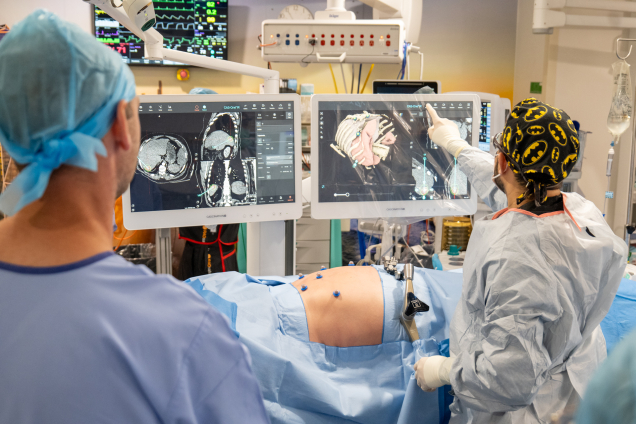
Gold Coast Health is the first in the southern hemisphere to use CAS-One, which combines sensors, CT/MRI scanning and artificial intelligence to help doctors target hard-to-reach lesions and tumours with ablation and then immediately assess whether the procedure was effective.
Dr Muddassir Rashid, Director of Interventional Radiology at Gold Coast Health, said CAS-One allows clinicians to take the minimally invasive ablation procedure to areas of the body previously hidden or impossible to reach.
“We have been doing ablation for a decade and have treated lesions we would describe as simple and easy,” Dr Rashid said.
“This technology allows us to push the boundaries and treat the more difficult lesions that are harder to see.”
CAS-One gives real time assistance to the surgeon through sensors and 3D imaging as they place a needle-guiding device into place. This guide allows the doctor to safely insert an ablation needle into a precise location in the body, avoiding critical structures along the way.
Once the ablation procedure is complete, CAS-One uses artificial intelligence to compare before and after CT scans to determine whether the procedure was successful. If there is any issue, the surgeon can rectify it immediately.
Dr Rashid emphasised the importance of this quality control aspect of CAS-One and its impact on the quality and efficacy of the ablation procedure.
“In those cases, the team did treat with ablation in the past, they wouldn’t know whether they were successful for another 3-6 months,” Dr Rashid said.
“We now know on the table whether we got all the lesion, and if we have any concerns, we can treat them immediately.”
The immediate assessment of the success of the procedure has the knock-on effect of saving clinician time, reducing follow up appointments and surgeries and reducing radiation exposure for patients.
Dr Rashid estimates there will be 20 cases per year that benefit from CAS-One, but he expects the number to increase as more patients are identified as being eligible for the procedure.
“Currently this technology is being used primarily for liver and kidney tumours, but in future we would like to expand this to lung and bone tumours as well,” Dr Rashid said.
Dr Rashid said he has seen and experienced many different medical technologies emerge with big claims, and CAS-One is one of the few that delivers.
“We have seen a lot of new systems come out and they seem fancy, but when you try them, they don’t necessarily stack up, but this system has been impressive. The very first one we did, it was bang on, hit it in the centre on the first go.
“It’s very good and we’re very lucky to have it here.”
“I would like to thank the whole Interventional Radiology team and the leadership of Gold Coast Health who have supported us to acquire this technology.”



